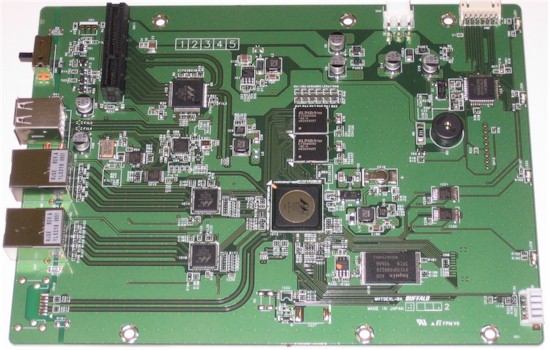Introduction
Updated 4/29/2010: ES and III price difference
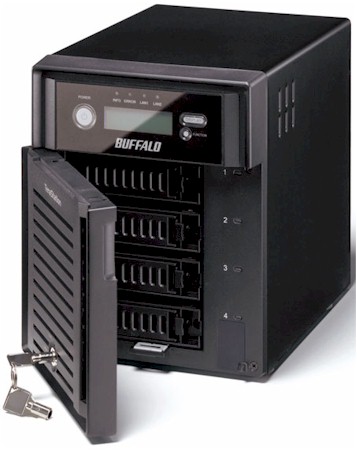
| At a Glance | |
|---|---|
| Product | Buffalo TeraStation ES (TS-XE20TL/R5) |
| Summary | Four-drive Marvell Kirkwood-based business NAS with NFS and AD support and remote, secure web access. Similar to TeraStation III, but lower cost and performance. |
| Pros | • NFS and DFS support • Dual Gigabit Ethernet with failover, aggregation • Secure, hosted remote access |
| Cons | • Slow admin GUI response • Slow USB and network backup • No non-Buffalo rsync support for network backup |
The TeraStation ES is a less expensive and lower-performance alternative to Buffalo’s mainstream four-bay NAS, the TeraStation III. It comes in 2, 4, 6 and 8 TB capacities. Buffalo sent the 2 TB model for review.
Physically, the ES and III are essentially the same and you’d be hard-pressed to tell the difference by just looking at the front side. But when you open the front door, you won’t see the 9 pin serial "Dianostic port" D connector found on the III. And the rear panel has dropped the serial port for UPS synchronization in favor of using the two USB ports for the purpose. Figure 1 shows the front and rear panels for both NASes with callouts.
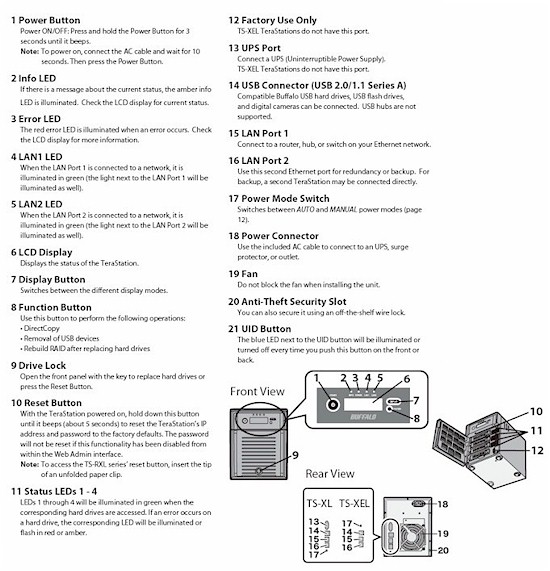
Figure 1: Front and rear panel callouts – TeraStation III and ES
The ES is less power-hungry than the III, drawing only 32W when active vs. 45 for the III. There is no programmable drive spindown, but you can a set sleep / wake schedule that knocks power consumption down to 10 W during sleep.
Internal Details
Getting inside the ES is as easy as it was for the III and the innards look very similar except for the board. See the III’s review if you want more pictures. Like the LinkStation Duo, the ES is based on a Marvell 88F6281 Kirkwood processor. But the ES uses a 1.2 GHz Kirkwood vs. a 600 MHz model. The TeraStation III is also Marvell-based, but uses a more powerful MV78100-A0 C080 Single-core ARMv5TE-compliant Feroceon clocked at 800 MHz.
Figure 2: TeraStation ES board
Where the III supported its four 3.5" SATA WD WD5000AAKS Caviar Blue 500 GB drives via a Marvell 88SX7042 SATA II controller, the ES uses a Marvell 88SM4140-LAD1 1-to-4 port SATA port multiplier for its four Samsung HD502HI F2 EcoGreen 500 GB drives. The ES has the same 512 MB of flash as the III, but only 256 vs. 512 MB of RAM. Like other Buffalo NASes, the drives are XFS-formatted.
Both have dual Marvell 88E1118s providing two Gigabit Ethernet ports that support independent, redundant, auto-failover and multiple aggregation modes and 4, 7 and 9 K jumbo frames. And both the ES and III have an NEC UPD78F0513 8-bit single-chip microcontroller to support the front LCD panel and buttons. I also spied an SMSC USB2512A 2 Port USB 2.0 Hub on the ES that the III didn’t have.
Features
The ES uses the AJAX-based web admin GUI found on other current Buffalo models. So it has the same slow-as-molasses response time I found most recently on the LinkStation Duo and shares the same annoyances. I just can’t figure out why it takes around 10 seconds for the username and password boxes to appear when you hit the admin page, but I sure wish Buffalo would fix it.
One bright point is that Buffalo has enabled logging in the ES. You can direct logs to a syslog server and there are links for System, File (SMB) and FTP logs. I was able to view the system log (linkstation.log) right in my FireFox browser, but only because it knows how to handle a .log extension.
Clicking the File Log link brought a download prompt for file.smb and selecting the FTP Log link (xferlog) brought a similar response. Save both these with a .txt extension and you’ll be able to open them in Wordpad or any other text editor just fine, though.
Here’s the ES’ Feature summary:
- Individual drive, RAID 0, 1, 5, 10 modes (no JBOD)
- Two volumes can be created
- Network file sharing via SMB/CIFS, AFP and NFS
- NT Domain and AD support
- Users and Group creation w/ Quotas for both
- FTP / FTP-S server
- HTTP / HTTPs file and admin access (not auto-forwarded)
- Email alerts
- Logging: Syslog and viewable / downloadable system, SMB and FTP logs
- Backup: Schedulable and immediate to other Buffalo NASes only (no non-Buffalo rsync support) and attached USB drive. One license for Memeo backup client included
- FAT, EXT3, XFS write/read USB drive support. NTFS read-only support
- Apple Time Machine backup support
- Secure Web-based remote access (hosted @ buffalonas.com)
- USB printer serving (incorrectly shown as missing in Buffalo’s online comparison chart)
- UPnP AV / DLNA media server (Twonky Media)
- iTunes server
- BitTorrent downloader
- UPS shutdown sync (via USB)
- DFS support
Features you won’t find include iSCSI support and online RAID expansion and migration. You also still can’t back up to anything other than another Buffalo NAS over a network connection. For some reason, Buffalo has chosen to not include the LAMP webserving capability that you’ll find in the LinkStation Duo, which I thought was an odd choice.
Performance
Tests were run with 1.30 firmware using our standard test process using Gigabit and 4k jumbo frame Gigabit LAN connections with all four drives configured in single RAID 0, 5 and 10 volumes.
Figure 3 summarizes all the results with non jumbo frame test results plotted. Write cache effects start to drop out at different file sizes for each volume type. But by 512 MB file size, true hardware performance dominates.
For writes, RAID 0 and 10 performance is about equal in the mid- 20 MB/s range, with RAID 5 the slowest at around 20 MB/s. Read performance is about the same for all three volume types and trends higher in the mid-to-high 30 MB/s range.
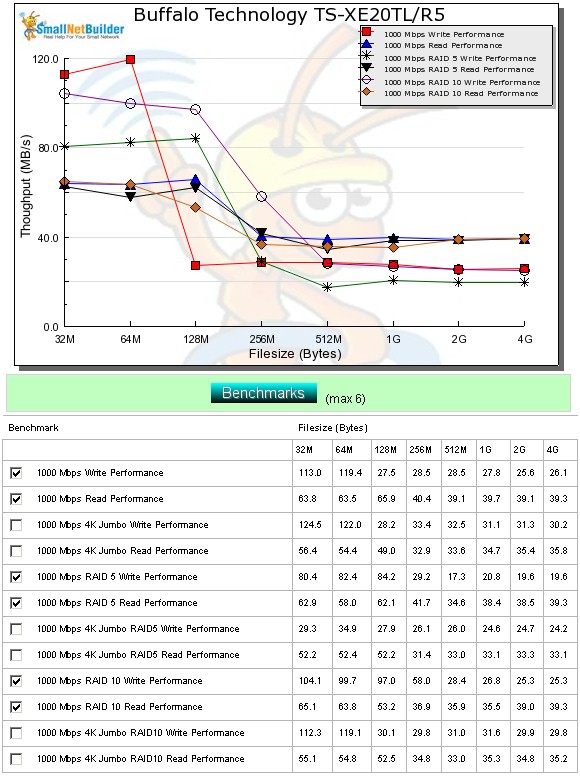
Figure 3: Performance Benchmark summary
RAID 5 Write performance with a 1000 Mbps LAN connection averaged over the 32 MB to 4 GB file sizes and with cached results above 125 MB/s removed from the average measured 44.2 MB/s with read speed significantly higher at 46.9 MB/s.
RAID 5 file copy write performance of 23.8 MB/s using our Vista SP1-based test ranked the ES ahead of other four-drive Kirkwood NASes like the Seagate BlackArmor NAS 440 and Iomega ix4-200d, both of which also run at 1.2 GHz clock rates. You can see in Figure 4 that the ES is essentially the same as the TeraStation III at 24 MB/s.
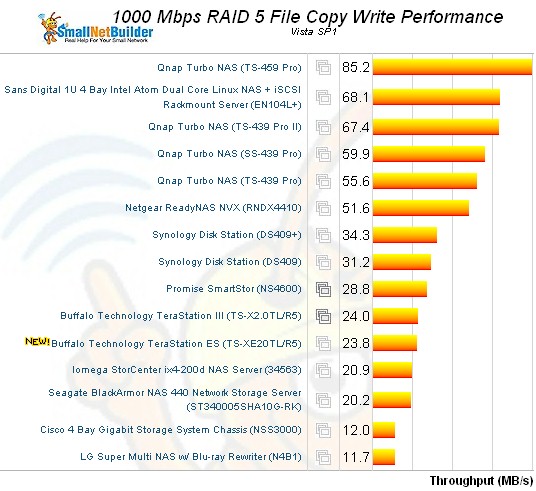
Figure 4: RAID 5 Filecopy write ranking
A check of Figure 5, which shows the RAID 5 filecopy read rankings for four-drive NASes, reveals quite a different story, however. The ES drops to the bottom of the 1.2 GHz Kirkwood pack at 39.9 MB/s and the TeraStation III leaves the ES in the dust at 55.1 MB/s.
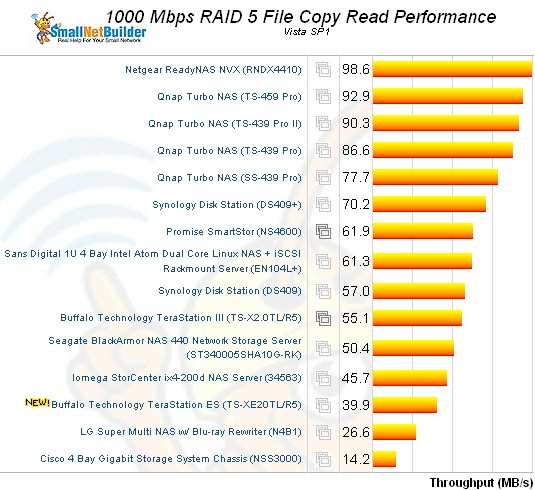
Figure 5: RAID 5 Filecopy read ranking
I also checked backup performance to an Iomega UltraMax Pro Desktop Hard Drive configured in RAID 0 attached to the ES’s USB 2.0 port. The test copies the 4.35 GB ripped DVD test folder that I use in the NAS Chart Vista SP1 file copy tests from the NAS to the attached drive. The results are summarized in Table 1.
| Product | Backup Throughput (MBytes/s) |
|---|---|
| USB – FAT32 | 8.42 |
| USB – EXT3 | 9.83 |
| USB – XFS | 10.03 |
Table 1: Backup throughput test summary
These results are close enough to the TeraStation III that I wouldn’t make backup performance the tipping point in a buy decision. Both products pale in comparison to the speeds I see in competitive NASes, particularly QNAP and Synology.
I also had the LinkStation Duo around from its review, so ran a network backup test from the ES to it. At 9.96 MB/s for an unencrypted, i.e. not over an SSL connection, I’m again not impressed. Buffalo needs to pay more attention in this area given the strides that their competitors are making.
Closing Thoughts
Updated 4/29/2010
If you’re a Buffalo NAS fan looking for a four-bay NAS with RAID 5 and 10 support and on a tight budget, then the ES is probably what you’re looking for. If you’re willing to give up a bit of performance and shop carefully, you can keep about $100 in your pocket (current difference between 2 TB ES and III) or more vs. buying a TeraStation III and get all the same features.

